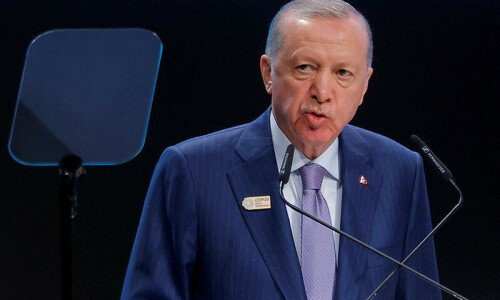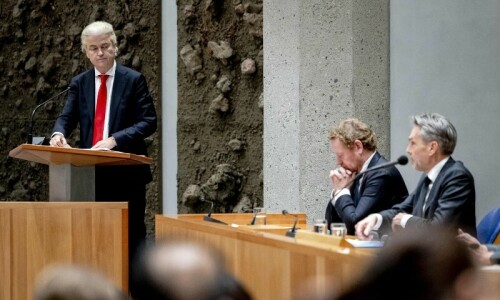BRUSSELS, Oct 23: Nato and Russia could play a role in eliminating Syria’s chemical weapons stockpiles if they were asked to do so by the United Nations, said US, Nato and Russian officials on Wednesday.
The destruction of Syria’s chemical weapons was discussed at a meeting of Nato and Russian defence ministers in Brussels, the first such meeting in two years.
That raised the possibility that Russia and Nato, which usually regard each other with suspicion, could end up cooperating in tackling the problem.
Nato Secretary General Anders Fogh Rasmussen said he expected Nato allies and Russia to respond positively if the United Nations asked them to help deal with the Syrian weapons.
“Whether that would be executed on an individual national basis or collectively, it’s really premature to make any assessment on that at this stage,” he told reporters.
US Defence Secretary Chuck Hagel also foresaw a possible role for Nato.
“If we can continue to see progress made ... in destroying chemical weapons in Syria, then it seems to me that this is going to open opportunities for a lot of nations to play roles in Syria in order to accomplish the objective. It may well be that Nato will be asked for some assistance,” he told a news conference after the meeting.
“Russia and Nato have many areas of common interest, including the destruction of Syria’s chemical weapons stockpiles,” he said.
But he stressed there were “no plans to have any US forces in any way in Syria.” Russian Defence Minister Sergei Shoigu said that if Russia received a request for help with eliminating the Syrian weapons, it would consider it and was ready to discuss the issue with Nato countries.
Deputy Foreign Minister Sergei Ryabkov said last month Russia was ready to help guard Syrian chemical weapons sites and destroy Assad’s stockpiles, but would not ship any of the chemical arms to Russia for destruction.
Russia and the United States are the only countries with industrial scale capacity to destroy mustard, VX, sarin or cyanide-armed munitions, but the import of chemical weapons is banned under US law.
Nato has shunned any involvement in the Syrian conflict apart from sending Patriot missiles to protect neighbouring Turkey.
After years of confrontation over Syria, Russia and the United States brokered a deal last month to put President Bashar al-Assad’s chemical arms stockpiles under international control.
The agreement avoided possible US military strikes that Washington said were intended to punish Assad for an Aug 21 poison gas attack.—Reuters











































Dear visitor, the comments section is undergoing an overhaul and will return soon.